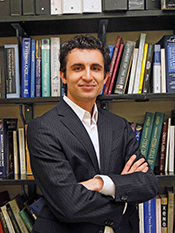Presented by: Dr. Pedro Baptista

"Organ transplantation is presently the only proven therapy able to extend survival for end-stage organ disease. It is also the only treatment available for severe acute organ failures and to some forms of inborn errors of metabolism. Nevertheless, the waiting list for organ transplantation is long and many patients will not survive long enough to receive an organ due to the dramatic shortage of donors or lack of eligibility. This distressing donor shortage is common to most solid organs like the liver, lung, heart and particularly kidneys. In light of the grim situation of organ transplantation, our laboratory has developed novel methods to generate an entire liver scaffold from whole animal livers, using tissue decellularization that preserves the organ’s vascular network. This same method is also able to decellularize other solid organs generating specific acellular kidney, lung, intestine, pancreas or heart scaffolds. Our subsequent studies showed the possibility to efficiently recellularize the liver bioscaffolds by perfusing them with human liver progenitor and endothelial cells in a perfusion bioreactor. The outcome of this is a bioengineered human liver. Although, most of the current generation of bioengineered organs lack in vivo-like functional tissue and physiological vascular networks, making their transplantation still a mirage. These challenges and potential solutions will be described in detail drawing a path to transplantation, to truly shape organ bioengineering into the Future of Transplantation Medicine.
Finally, the generation of surgical models adequate to test the viability and function of these bioengineered organs is also vital. Hence, in our laboratory we have devised a novel heterotopic auxiliary liver transplantation procedure that makes use of blood flow sensors to monitor hepatic artery and portal vein flows. These readings are essential to calibrate anti-coagulation and platelet anti-aggregation in the ensuing transplantation of bioengineered livers, which might have still immature vascular trees. Blood flow monitorization in experimental liver transplantation will also be discussed as the future gold standard for chronic blood flow measurement."